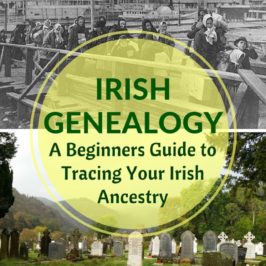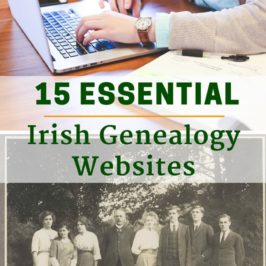This post may contain affiliate links. If you make a purchase through a link, I may receive a small commission, at no cost to you. These commissions help keep this website up and running, and I thank you for your support. Read my full disclosure here.

Discovering your Irish roots is an exciting journey. Whether you’re a complete novice or more advanced, these ten Irish genealogy books are a great starting point for discovering your Irish ancestors.
How to Trace Your Irish Ancestors: 2nd edition
Ian Maxwell
How to Trace Your Irish Ancestors provides a practical guide to help you through the maze of Irish family research. Maxwell provides details of the many available resources and helps you find what you’re looking for without going the long way round. He provides great insight into what is available, including many alternative records and where to find them. By making it simpler for you to organise your search, this book will save you a lot of time.
Tracing Your Northern Irish Ancestors: A Guide for Family Historians
Ian Maxwell
If you are tracing Northern Irish Ancestors, then you need all the help you can get. Unlike the rest of the British Isles which have very extensive civil and census records, Irish ancestral research is hampered by the 1920’s destruction of many of the major collections due to fire. But Ian Maxwell knows his way around the surviving records better than anyone else, including those online and in record offices. If you are serious about tracing your Ulster ancestors, Catholic or Protestant, then this book Tracing Your Northern Irish Ancestors will help you to discover the various records such as school registers, church records, trade-directories, fragments of census records and land-records.
Tracing Your Irish Ancestors: A Complete Guide
John Grenham
Now in its 4th edition, John Grenham’s book Tracing Your Irish Ancestors: A Complete Guide provides great insight into what resources are available, including offline and online resources as well as many alternative records and where to find them. The sheer scale of digitisation can make it both easier and more confusing to do research, but this book will provide you with detailed guidance. The chapter layout helps you to target information and concise explanations are offered at every step to help you refine your searches. He also includes county-by-county reference lists which are ideal if you know the area in Ireland you want to focus on.
Tracing Your Irish Family History on the Internet: A Guide for Family Historians
Chris Paton
Although many of Ireland’s primary records were lost during the civil war in 1922 and through other equally tragic means, this book shows that not only has a great deal of information survived, but that much more of it is being made available online. No longer do you need to travel to Ireland in order to research your family history. In Tracing Your Irish Family History on the Internet, Chris Paton examines the different sources available on the internet by explaining it through fascinating case studies. He also explores how social media can be a useful tool in your Irish family history research.
Tracing Your Irish Family History
Anthony Adolph
Author and genealogist Anthony Adolph gives insider tips on how best to locate and access specific family information in Ireland, including county archives and libraries, local publications, tax rolls, censuses, religious and civil registers, court and military books, as well as many other more obscure records. He also includes good advice on researching sources in the US, Canada, England, Wales, Argentina, Australia and New Zealand.
Tracing Your Irish Family is beautifully illustrated with photographs and illustrations. Adolph also provides step-by-step guidance on vital data resources such as Griffith’s Valuation and Tithe Applotments, Fiants and Poor Law Records, Irish place names and Anglicization, surname meanings, prominent pedigrees, genetics, ancient Irish roots and heraldry. This book is an excellent resource for beginners as well as experienced genealogists.
Researching Your Irish Ancestors at Home and Abroad
David R. Elliott
David R. Elliott has taken eight research trips to Ireland on behalf of his clients and has worked in most archival repositories in the Republic of Ireland and Northern Ireland. His book, Researching Your Irish Ancestors at Home and Abroad, will provide you with advice in finding your ancestral county, as well as the parish and townland within the county. Drawing on his experience, Elliott explains how Irish archival centres work, how you can use them to flesh out your ancestors lives and what you might find in cemeteries.
If you’re planning on travelling to Ireland to carry out further ancestry research, Elliott gives practical advice on preparing for your trip with tips on travel, driving, accommodation, and meals.
Surnames of Ireland: Sixth Edition
Edward MacLysaght
Ireland was one of the earliest countries to evolve a system of hereditary surnames. More than 4,000 Gaelic, Norman and Anglo-Irish surnames are listed in this book, giving a wealth of information on the background and location of Irish families.
Surnames of Ireland: Sixth Edition is the definitive work on this subject and goes so far as to indicate modern (often shortened) Gaelic spellings alongside of the original so that a name’s deviation is evident. So too are inventions (i.e. late-Norman) and borrow-names (ie. Nordic or English).
This book does not provide you detailed family history, but will help you in your surname search. If you enjoy this book, then you can also purchase MacLysaght follow up book, More Irish Families, which includes less common names.
However, if you are looking for more detailed information, then MacLysaght’s Irish Families: Their Names, Arms, and Origins, 4th Edition covers about 300 Irish families and goes into brief details as to what county they originated in, the clans they belonged to, and the original Gaelic spelling, history and in many cases their coat of arms, including colour illustrations.
A New Genealogical Atlas of Ireland, Second Edition
Brian Mitchell
Civil registration for everyone in Ireland didn’t begin until 1864. Prior to this the records of births, marriages, and deaths were only found in local parishes. Although any of the Townland Indexes from 1851, 1871, or 1901 will show the location of each civil parish, it has been much more difficult to uncover the corresponding Catholic parish or Presbyterian congregation.
A New Genealogical Atlas of Ireland is an extremely useful book because it provides maps of each of the 32 Irish counties. Each county has five maps; one depicting the Church of Ireland parishes, one showing the baronies and Church of Ireland dioceses, one of the poor law unions and parishes included within probate districts, one of Roman Catholic parishes and dioceses, and a fifth set of maps for the nine counties of Northern Ireland shows Presbyterian congregations.
Tracing Your [County] Ancestors Series
Various Authors
This series of Irish ancestry books is published by the Dublin publisher, Flyleaf Press. They are an excellent resource if you know the particular Irish county that you want to focus on. The layout of these books is straightforward with easy to follow examples. Each book focuses on a particular county and provides detailed information about the census, church records, land and estate records and other useful reference points such as newspapers and gravestone inscriptions. There are the books available for researchers exploring their roots in the following counties:
How to Archive Family Keepsakes: Learn How to Preserve Family Photos, Memorabilia and Genealogy Records
Denise May Levenick
If you’ve inherited a collection of family photographs, heirlooms, and genealogy records it may feel more of a burden than a blessing. But that’s where author Denise May Levenick comes to the rescue. In How to Archive Family Keepsakes, she provides step-by-step advice on how to organize, distribute and preserve family heirlooms. You’ll learn how to organize those boxes of inherited stuff, decide what to keep and what items to donate to museums, societies, and charities and how to protect and pass on important keepsakes. It will also explain how to create a catalogue for genealogy files and paperwork as well as how to digitize family history records and organize computer files to improve your research.
Additional Irish Ancestry Resources
- Irish Genealogy: A Beginners Guide to Tracing Your Irish Ancestry: Do you want to trace your Irish genealogy and discover more about your Irish ancestry? This guide will provide you with the essential information you need.
- 15 Essential Irish Genealogy Websites: These 15 websites will be essential in your Irish ancestry research and include 11 free and 4 subscription websites.
- Forums: Join these forums to get access to a large community of experienced and knowledgeable family historians who will do their best to help you.
- Rootschat.com – Specifically the Ireland forum
- Boards.ie – Specifically the Genealogy forum














Leave a Reply